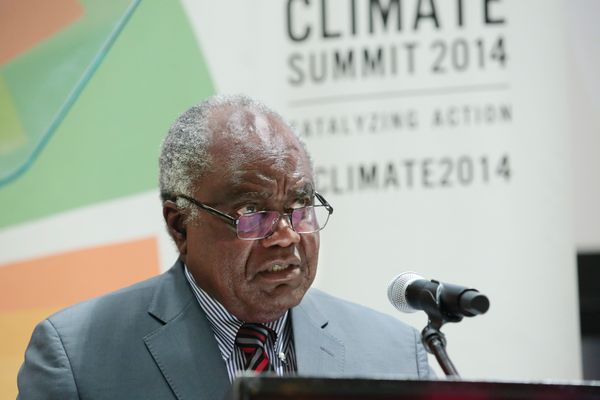Hifikepunye Pohamba is about to complete his tenure as President, having served the maximum two terms allowed by the constitution. He leaves an impressive legacy of consensus building

© Evan Schneider / UN Photo
Outgoing President Hifikepunye Pohamba has been involved in Namibian politics since before the country even gained its modern name. The political heavyweight was one of the founders of Swapo, the rebel movement that fought a decades-long campaign against Apartheid South Africa until Namibia finally won its independence in 1990.
Once seen as playing second fiddle to former Swapo leader and President Sam Nujoma – who, even during Pohamba’s first election, was viewed as the ‘power behind the throne’ – over the past decade Pohamba has cemented his own authority and legacy in the country. Today he is known as the softly spoken consensus builder who adopted a less autocratic, more inclusive form of governance upon taking up the mantle, declaring the fight against corruption to be his administration’s main focus. While corruption has been a persistent spectre throughout his tenure – largely fuelled by the continuation of patronage among officials, despite the establishment of the somewhat ineffectual Anti-Corruption Commission – President Pohamba will be remembered for his eloquence and stature during crises.
Back in 2004 Pohamba inherited a Swapo that was internally divided and a nation that was relatively stable, despite its people struggling with income inequality, severe poverty and a collapsing education system. Throughout his rule, Pohamba persistently launched initiatives and projects to combat these concerns, with varying degrees of success. Both he and Swapo have long tried to solve the issue of land ownership – a legacy left over from the colonial era that left much of Namibia’s fertile farmland in the hands of a tiny white minority – and have made a considerable, if gradual, degree of progress.
“We must respond with a sense of urgency so that the problems related to land reform and distribution do not become perennial,” says Pohamba. “In this regard, I am once again requesting those who own excess land to sell part of it to government for distribution to our landless citizens.”
Pohamba has also focused development efforts through the implementation of a series of Namibian Development Plans (NDPs), which he has termed as “critical components in national planning and development”. The latest such plan, NDP 4, focuses on fewer targets than previous plans and involves the dramatic upscale of Namport, Namibia’s primary port, positioning it as the main route to Southern Africa. It also looks to the creation of the Walvis Bay Corridor Group for the transport of freight to Namibia’s neighbours.
When UN Secretary-General Ban Ki-moon visited Namibia to commission the UN House in Windhoek, he praised the country on its establishment of liberties such as press freedom and gender equality, also commending its democratic system and its handling of the refugee situation since the country’s independence – Pohamba has helped reduce the number of refugees by several thousand since 2001. But the President was not content to bask in such praise, thanking the Secretary-General but also expressing his frustration with the UN’s misleading classification of Namibia as an upper-middle-income country, saying that this is impacting badly on its economy as it paints an unrealistically wealthy picture of Namibia and blocks the inflow of foreign aid.
“It seems no one understands us, despite the fact that the United Nations has representatives in the country who see the reality on the ground,” he says. “We have very poor people and I hope one day the United Nations system can assist us.”
After a decade in power, Pohamba now says that he is ready to hand over the reins to a new leader. He believes that the inauguration of the new President and members of the National Assembly will demonstrate the maturity and strength of Namibia’s democracy. “We are proud that democracy in our country has ensured peace and stability and provided a conducive environment for socio-economic development and progress. Yes, the challenges are many, however, they are not insurmountable,” he adds. “We are facing the future with confidence and determination.
“We are proud that the Namibian people from different political persuasions came together in an unprecedented act of patriotism and crafted one of the most acclaimed national constitutions in the world.
This enduring fundamental law enshrines and guarantees our people’s most fundamental rights and basic freedoms, including the right to life, equality, freedom of expression and freedom of association. It is the foundation upon which we established our new republic, determined to advance the best interest of all our people, and ready to make its contribution towards global peace and security. This nation will always celebrate and give requisite honour to our proud history.”
On 21 March 2015, on the ten-year anniversary of his first ascent into presidential office, Pohamba will pass the mantle on to fellow Swapo member Hage Geingob, who has served as Prime Minister since 2000, thus continuing the party’s basically unchallenged quarter century in office.





